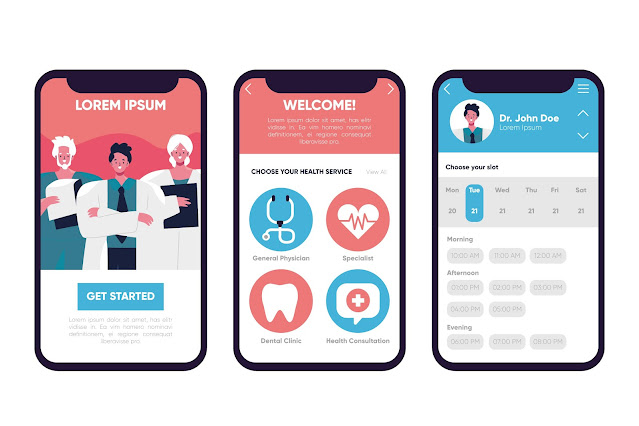How To Build Custom mHealth App
Mobile health, abbreviated as mHealth, encompasses the utilization of wireless technologies and mobile devices to enhance health outcomes. The integration of smartphones, tablets, wearables, and similar gadgets allows for various applications in the realm of health, including data collection, health education and support, as well as remote patient monitoring and care.
mHealth app development companies play a crucial role in harnessing the potential of mobile health technology. These specialized firms possess the expertise and knowledge required to create innovative and impactful mobile health applications. Their proficiency in mobile health app development enables them to leverage wireless technologies and mobile devices to improve health outcomes.
mHealth encompasses a wide range of applications, including:
Collection of Health Data: Mobile devices, developed by mHealth app development companies, enable the collection of diverse health data, encompassing vital signs, medication adherence, and activity levels. Such data facilitates the monitoring of health trends, identification of risk factors, and informed decision-making in healthcare.
Health Education and Support: mHealth app development companies leverage mobile devices as platforms for delivering health education and support to patients and caregivers. These platforms offer comprehensive information on diseases, treatments, and healthy lifestyles, empowering individuals to make informed choices regarding their well-being.
Remote Patient Monitoring: Through their expertise in mobile health app development, these companies enable remote monitoring of patients' health status using mobile devices. This capability aids in identifying and managing chronic conditions, preventing complications, and ultimately improving patient outcomes.
Delivery of Care: Mobile health app development companies create applications that serve as conduits for delivering care to individuals in remote areas or underserved communities. These applications facilitate activities such as telehealth consultations, chronic disease management, and vaccination campaigns, ensuring access to quality healthcare for all.
Benefits of mHealth apps
mHealth apps offer a number of benefits, including
Enhanced Care Accessibility: mHealth apps enable patients to conveniently access healthcare services, regardless of their geographic location or socioeconomic status.
Heightened Patient Engagement: By offering information, education, and support, mHealth apps empower patients to take an active role in managing their health effectively.
Cost Reduction: Through preventive care, chronic disease management, and improved patient outcomes, mHealth apps contribute to reducing healthcare expenses.
Enhanced Population Health: mHealth apps play a vital role in promoting healthy lifestyles, preventing diseases, and effectively managing chronic conditions, thereby fostering improvements in overall population health.
Steps To Build A custom mHealth App
Perform Market Analysis
Market research is a critical component of mobile health app development as it directly impacts the value and impact your product can have in the market.
To ensure success, it's essential to conduct a thorough analysis and gain a deep understanding of your industry, target audience, and competitors. By immersing yourself in this knowledge, you'll uncover valuable insights regarding the unique value your app can offer and the specific challenges it can address.
Taking the time to perform this research will lay a strong foundation for your mHealth app development journey, empowering you to create a solution that truly meets the needs of your users and stands out in the competitive landscape.
Study Your Audience
When developing healthcare applications, it is crucial to consider your target audience. Depending on the specific nature of your app, your intended users could be patients, doctors, women, athletes, or other specific groups.
Understanding the primary challenges that your potential users encounter with outdated systems is essential. To gain valuable insights and establish a strong connection with your future customers, conducting interviews, organizing focus groups, or collecting surveys can be highly beneficial.
These methods enable you to gather firsthand information about the pain points and needs of your target audience, allowing you to build a more effective and user-centric healthcare application.
Choose App Type
When considering the development of a mobile health app, it is crucial to understand the specific type you aim to create, as this choice will influence various aspects such as the app's database, functionality, and overarching objectives.
Determine the Purpose: Define the nature of the app you intend to create. Is it a fitness tracking app, a telemedicine platform, a medication reminder tool, or something else?
Addressing User Needs: Identify the specific problems or challenges your app aims to address. This understanding will inform the features, user interface, and overall user experience, ensuring that your app effectively caters to the needs of its intended audience.
Functional Design: Work with the mhealth app development company team to establish how the app will function. Consider the user flow, features, and interactions necessary to fulfill the app's purpose and provide a seamless user experience.
Choosing the Right Development Team
Building a custom mHealth app requires careful consideration and collaboration with a reliable and experienced mhealth app development company.
Selecting the right team is a crucial step in ensuring the success of your mHealth app project.
- Define Your Requirements
- Research and Shortlist
- Assess Expertise and Experience
- Review Portfolio and References
- Evaluate Technical Skills
- Communication and Collaboration
- Consider Support and Maintenance
Invest in Engaging Design
The significance of design cannot be underestimated when it comes to mHealth apps. It plays a pivotal role in determining whether users will download the app and how they will interact with it.
The ultimate goal of the design is to ensure that your users are not only satisfied with the app but also find its functionality seamless. While there are no-code platforms available that provide pre-designed templates for convenience, you also have the option to create a design from scratch, tailored to your specific requirements and vision. This allows you to have full control over the aesthetics and user experience of your mHealth app.
Make It HIPAA Compliant
It is important to recognize that the healthcare industry operates within a highly sensitive environment, necessitating strict adherence to various requirements and guidelines.
For instance, if you plan to develop an app for use in the United States, it is essential to ensure compliance with the Health Insurance Portability and Accountability Act (HIPAA) regulations. Similarly, in Europe, mHealth platforms that handle personal user data must adhere to the General Data Protection Regulation (GDPR).
HIPAA compliance holds significant importance in this context. Given that mHealth apps handle sensitive healthcare information, it is crucial to safeguard this data for the benefit of both healthcare professionals and patients
Conclusion
Healthcare mobile app development services are in high demand. mHealth seems to lead a brand-new way for the whole medical industry. The immense rise of these applications appeared during the pandemic.
However, this industry requires knowledge and expertise to ensure your product will be in demand and safe for patients.
Working with an experienced mHealth app development company offers several advantages. They understand the complexities of the healthcare industry, possess domain-specific knowledge, and can navigate through challenges unique to mHealth app development.
Additionally, they can provide valuable insights and guidance throughout the development process, ensuring that your app meets the highest standards of functionality, security, and user experience.
Read Also:
Managing Remote Development Teams in 2023: Best Practices and Tips for Success




Comments
Post a Comment